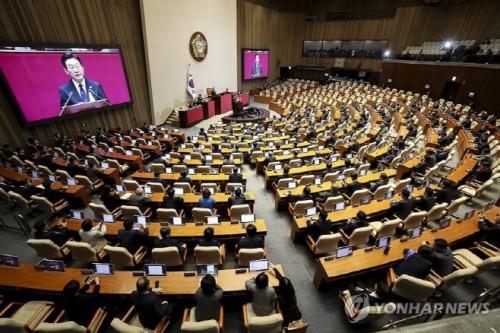 |
| President Lee Jae-myung delivers a policy speech on the government’s 2026 budget plan at the National Assembly in Yeouido, Seoul, on November 4. / Source: Yonhap News |
President Lee Jae-myung’s administration has unveiled a record 728 trillion won budget plan for next year — an 8% increase from this year — setting the stage for a heated partisan debate. The government says the expanded budget will lay the foundation for national growth through large-scale investment in artificial intelligence (AI), while the opposition has denounced it as a “populist spending spree.”
In his policy speech at the National Assembly on November 4, President Lee announced the 2026 total expenditure plan of 728 trillion won, up 8.1% from this year’s 673 trillion won — the first time ever that Korea’s annual budget surpasses 700 trillion won. The government aims to spearhead “AI transformation” across major industries such as automobiles, shipbuilding, and semiconductors, while also strengthening income security for vulnerable groups and promoting balanced regional development.
“In the age of AI, a single day’s delay can set an entire generation back,” Lee said in his address. “We must accelerate from now to catch up with the frontrunners. Building the AI highway is the key to opening the future of growth and progress,” he added, underscoring the need for continued fiscal expansion.
The ruling Democratic Party of Korea (DPK) welcomed the plan as a vision to launch “a new century of national growth.” Chief Spokesperson Park Soo-hyun said, “The administration’s first budget clearly presents a national vision to restore democracy, livelihood, and the future from past wounds. Together with the people, we will open the AI era and lay the cornerstone for Korea’s next hundred years of growth.”
Rep. Lee So-young also defended the government’s expansive fiscal stance, saying at a budget forum the day before, “This budget is a design to execute the new government’s core agenda. Restoring what was destabilized under the previous Yoon Suk Yeol administration inevitably requires significant energy and fiscal input.”
However, the conservative People Power Party (PPP) sharply criticized the plan as “populist” and fiscally reckless. The opposition argued that the budget, which is projected to push Korea’s national debt ratio beyond 50% of GDP next year (up from 49.1% this year), would burden future generations.
PPP spokesperson Choi Soo-jin said, “The government has drawn up a record 728 trillion won deficit budget — a textbook example of populism. With local elections approaching, cash-handout programs such as regional gift certificates and rural basic income will only leave a debt bomb for the next generation.”
Another PPP official, Choi Bo-yoon, added, “This so-called ‘super budget’ isn’t about AI — it’s about debt and electioneering. Under the guise of ‘fiscal expansion,’ the government is indulging in self-congratulatory spending funded by borrowing.”
Given the intensity of opposition criticism, the budget may face revisions during the upcoming parliamentary review. The National Assembly’s Special Committee on Budget and Accounts will hold a public hearing on November 5, followed by two days of policy inquiries starting November 6. Departmental budget reviews are scheduled for November 10–13, leading up to a final subcommittee adjustment and full-committee vote on the 2026 budget bill.
Most Read
-
1
-
2
-
3
-
4
-
5
-
6
-
7





















